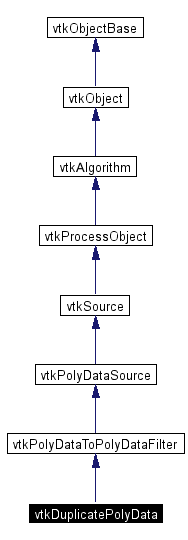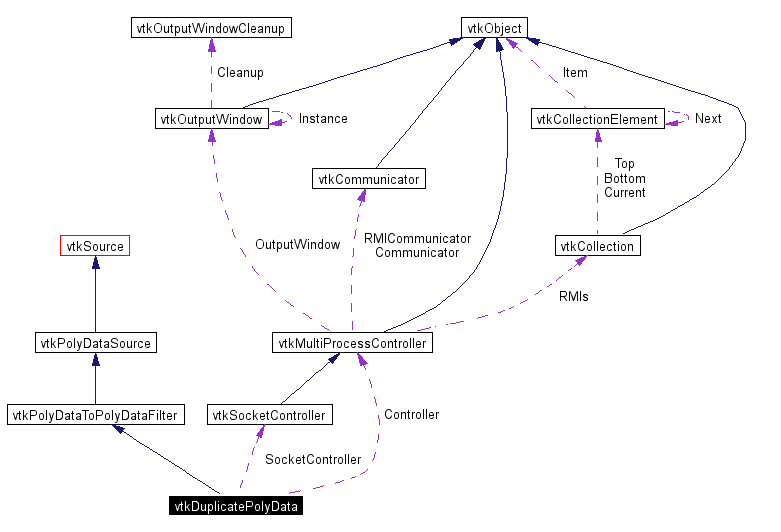vtkDuplicatePolyData Class Reference
#include <vtkDuplicatePolyData.h>
Inheritance diagram for vtkDuplicatePolyData:
 [legend]
[legend]Collaboration diagram for vtkDuplicatePolyData:
 [legend]List of all members.
[legend]List of all members.
Detailed Description
For distributed tiled displays.
This filter collects poly data and duplicates it on every node. Converts data parallel so every node has a complete copy of the data. The filter is used at the end of a pipeline for driving a tiled display.
- Created by:
-
- CVS contributions (if > 5%):
-
- CVS logs (CVSweb):
/Parallel/vtkDuplicatePolyData.h)/Parallel/vtkDuplicatePolyData.cxx)
Definition at line 41 of file vtkDuplicatePolyData.h.
Member Typedef Documentation
Constructor & Destructor Documentation
| vtkDuplicatePolyData::vtkDuplicatePolyData |
( |
|
) |
[protected] |
|
Member Function Documentation
|
|
Create an object with Debug turned off, modified time initialized to zero, and reference counting on.
Reimplemented from vtkAlgorithm. |
| virtual const char* vtkDuplicatePolyData::GetClassName |
( |
|
) |
[virtual] |
|
| int vtkDuplicatePolyData::IsTypeOf |
( |
const char * |
type |
) |
[static] |
|
|
|
Return 1 if this class type is the same type of (or a subclass of) the named class. Returns 0 otherwise. This method works in combination with vtkTypeRevisionMacro found in vtkSetGet.h.
Reimplemented from vtkPolyDataToPolyDataFilter. |
| virtual int vtkDuplicatePolyData::IsA |
( |
const char * |
type |
) |
[virtual] |
|
|
|
Return 1 if this class is the same type of (or a subclass of) the named class. Returns 0 otherwise. This method works in combination with vtkTypeRevisionMacro found in vtkSetGet.h.
Reimplemented from vtkPolyDataToPolyDataFilter. |
| void vtkDuplicatePolyData::PrintSelf |
( |
ostream & |
os, |
|
|
vtkIndent |
indent |
|
) |
[virtual] |
|
|
|
Methods invoked by print to print information about the object including superclasses. Typically not called by the user (use Print() instead) but used in the hierarchical print process to combine the output of several classes.
Reimplemented from vtkPolyDataToPolyDataFilter. |
|
|
By defualt this filter uses the global controller, but this method can be used to set another instead. |
|
|
By defualt this filter uses the global controller, but this method can be used to set another instead. |
| void vtkDuplicatePolyData::InitializeSchedule |
( |
int |
numProcs |
) |
|
|
| virtual void vtkDuplicatePolyData::SetSynchronous |
( |
int |
|
) |
[virtual] |
|
|
|
This flag causes sends and receives to be matched. When this flag is off, two sends occur then two receives. I want to see if it makes a difference in performance. The flag is on by default. |
| virtual int vtkDuplicatePolyData::GetSynchronous |
( |
|
) |
[virtual] |
|
|
|
This flag causes sends and receives to be matched. When this flag is off, two sends occur then two receives. I want to see if it makes a difference in performance. The flag is on by default. |
| virtual void vtkDuplicatePolyData::SynchronousOn |
( |
|
) |
[virtual] |
|
|
|
This flag causes sends and receives to be matched. When this flag is off, two sends occur then two receives. I want to see if it makes a difference in performance. The flag is on by default. |
| virtual void vtkDuplicatePolyData::SynchronousOff |
( |
|
) |
[virtual] |
|
|
|
This flag causes sends and receives to be matched. When this flag is off, two sends occur then two receives. I want to see if it makes a difference in performance. The flag is on by default. |
|
|
This duplicate filter works in client server mode when this controller is set. We have a client flag to diferentiate the client and server because the socket controller is odd: Proth processes think their id is 0.
Definition at line 71 of file vtkDuplicatePolyData.h. |
|
|
This duplicate filter works in client server mode when this controller is set. We have a client flag to diferentiate the client and server because the socket controller is odd: Proth processes think their id is 0. |
| virtual void vtkDuplicatePolyData::SetClientFlag |
( |
int |
|
) |
[virtual] |
|
|
|
This duplicate filter works in client server mode when this controller is set. We have a client flag to diferentiate the client and server because the socket controller is odd: Proth processes think their id is 0. |
| virtual int vtkDuplicatePolyData::GetClientFlag |
( |
|
) |
[virtual] |
|
|
|
This duplicate filter works in client server mode when this controller is set. We have a client flag to diferentiate the client and server because the socket controller is odd: Proth processes think their id is 0. |
| virtual unsigned long vtkDuplicatePolyData::GetMemorySize |
( |
|
) |
[virtual] |
|
|
|
This returns to size of the output (on this process). This method is not really used. It is needed to have the same API as vtkCollectPolyData. |
| void vtkDuplicatePolyData::ComputeInputUpdateExtents |
( |
vtkDataObject * |
output |
) |
[protected, virtual] |
|
|
|
What is the input update extent that is required to produce the desired output? By default, the whole input is always required but this is overridden in many subclasses.
Reimplemented from vtkPolyDataSource. |
| void vtkDuplicatePolyData::Execute |
( |
|
) |
[protected, virtual] |
|
|
|
This method is the old style execute method
Reimplemented from vtkSource. |
| void vtkDuplicatePolyData::ClientExecute |
( |
|
) |
[protected] |
|
| void vtkDuplicatePolyData::ExecuteInformation |
( |
|
) |
[protected, virtual] |
|
Member Data Documentation
The documentation for this class was generated from the following file:

